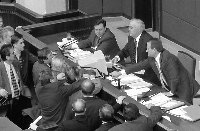Ukraine Joins Interparliamentary Assembly

After Comrade Symonenko's project collected the required 223 votes the Speaker summoned faction leaders for a closeted conference to find out why "previous arrangements" had not worked. According to Taras Stetskiv, direct instructions were given Batkivshchyna, Regions, Greens, and SDPU(u) to secure accession to the CIS body. Vasyl Khmelnytsky, cochairman of the Green faction, when asked by The Day to comment on this allegation, said: "Regrettably, Mr. Pustovoitenko issued no such instructions, so the faction decided to vote as we saw fit." And there was no need to ask the Social Democrats, for Mr. Chornovil stated that Messrs. Surkis and Zinchenko left their ballots before flying to Madrid to watch a major soccer game, and their cards were used to vote for aiming "Ukraine's foreign political vector in the Eurasian, rather than European direction."
Many are convinced that Leonid Kuchma's sanctioning accession to assembly is another asset gained by Oleksandr Tkachenko. One of the Agrarian leaders made it clear that the President was afraid that by signing a resolution on the issue he would play into Mr. Tkachenko's hands, and that the Chief Executive was actually playing a double game, supporting the project with one hand and pointing accusingly at it with the other. In other words, by announcing nationwide that Mr. Kuchma was for joining the assembly, the Speaker put him in an embarrassing situation. "It is hard to imagine how Leonid Kuchma is going to collect votes on the Right Bank," wonders Taras Stetskiv. Most importantly, voters are not the only people asking themselves what made the President change his stand seven months before the campaign after opposing the Interparliamentary Assembly idea for three years. This "multivector" conduct will prompt the Communists to suggest that after he becomes President again he will go back on his word just as easily. And even democrats may think twice before backing a man veering about like a weathervane.
PS: Yuri Kostenko's Rukh faction intends to contest Parliament's resolution in the Constitutional Court.
From The Day's files
The CIS Interparliamentary Assembly was founded as per an agreement signed March 27, 1992, in Almaty, by the Speakers of Belarus, Armenia, Kazakhstan, Kyrgyzstan, the Russian Federation, Tajikistan, and Uzbekistan. Azerbaijan, Georgia, and Moldova acceded later. Uzbekistan took no part in its activities. The body's head office is in St. Petersburg and Secretariat in the Tavriya Palace (where the State Duma of the Russian Empire once met). The organization has an Assembly Council and standing and ad hoc committees. Chairmen of the council and commissions are elected, as a rule, from among Russian dignitaries. It is currently headed by Mikhail Krotov, Deputy of the Council of the Federation.
The Interparliamentary Assembly has observer status with the Interparliamentary Union. Ukraine has participated in the assembly as an observer, sending delegations mostly composed of Left factions of Parliament. There are no reports in writing on their work in the assembly.
The body is governed by the CIS Charter, not signed by Ukraine. The document defines the assembly as an international consultative body to discuss matters relating to cooperation and joint proposals of national parliaments, facilitating the rapprochement and harmonization of national legislation. Pursuant to the Interparliamentary Assembly Convention, signed on May 26, 1995, by the heads of member states, the organization's principal objective is to convert the CIS into an association of countries with harmonized legislation; it is expected to adopt standard elements of law and recommendations meant for CIS member states.
The convention authorized the assembly to make international treaties on behalf of the signatories; in other words, it is actually granted the status of an international legal entity. According to Volodymyr Tkachenko, author of the book The Commonwealth of Independent States and the Interests of Ukraine, this status runs counter to the Ukraine's Declaration of National Sovereignty. Article 13-17 of the convention reflect body's claims to this status. Assembly officials enjoy immunity and privileges similar to those vested in the officials of international organizations.
Under a protocol decision of the Interparliamentary Assembly Council of June 8, 1994, the Secretariat of the body's council is exempt from all direct and indirect taxes and duties, federal as well as local, and the same applies to all customs payments. Its humanitarian fund is also likewise tax-exempt.
Ukraine's accession to the organization is expected to require a 25-30% share of its overall budget.
If the Russian Duma's proposal is implemented, Russia will get 148 of the body's 268 seats; Ukraine will have 52; 22 will go to Uzbekistan, 17 to Kazakhstan, 10 to Belarus; Azerbaijan, Georgia, and Tajikistan will receive 8 each; Armenia, Moldova, and Turkmenistan (still not affiliated) will have 4 each.
The assembly's influence on CIS status is supposed to be limited. It
has not as yet developed an effective vehicle to monitor the implementation
of its own decisions.
Выпуск газеты №:
№9, (1999)Section
Day After Day





